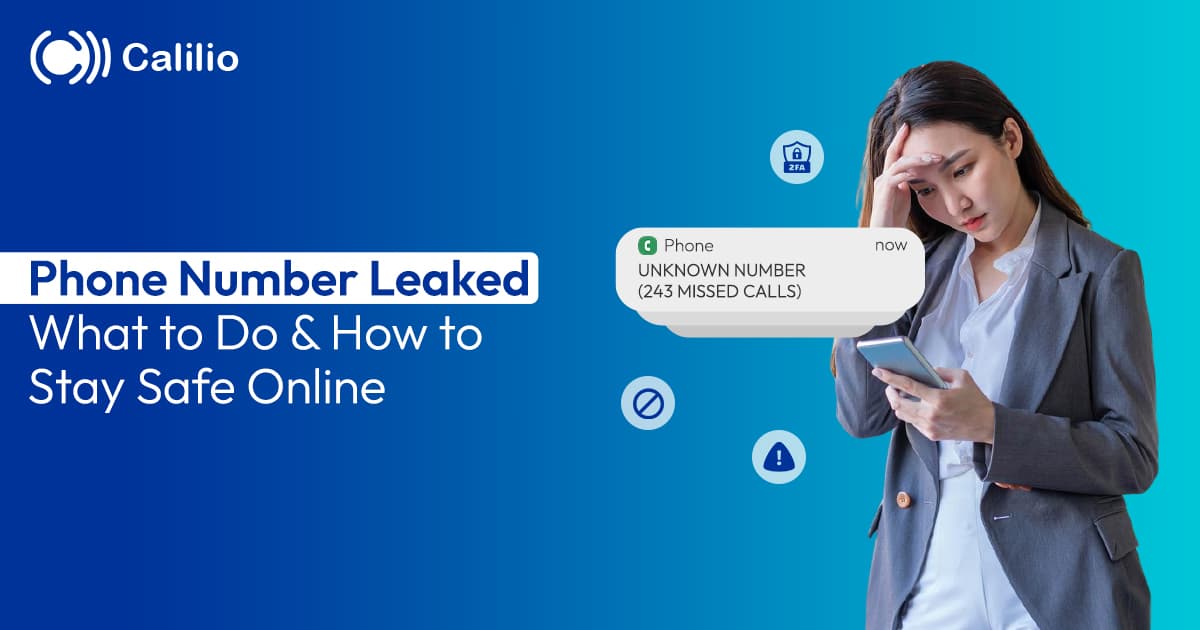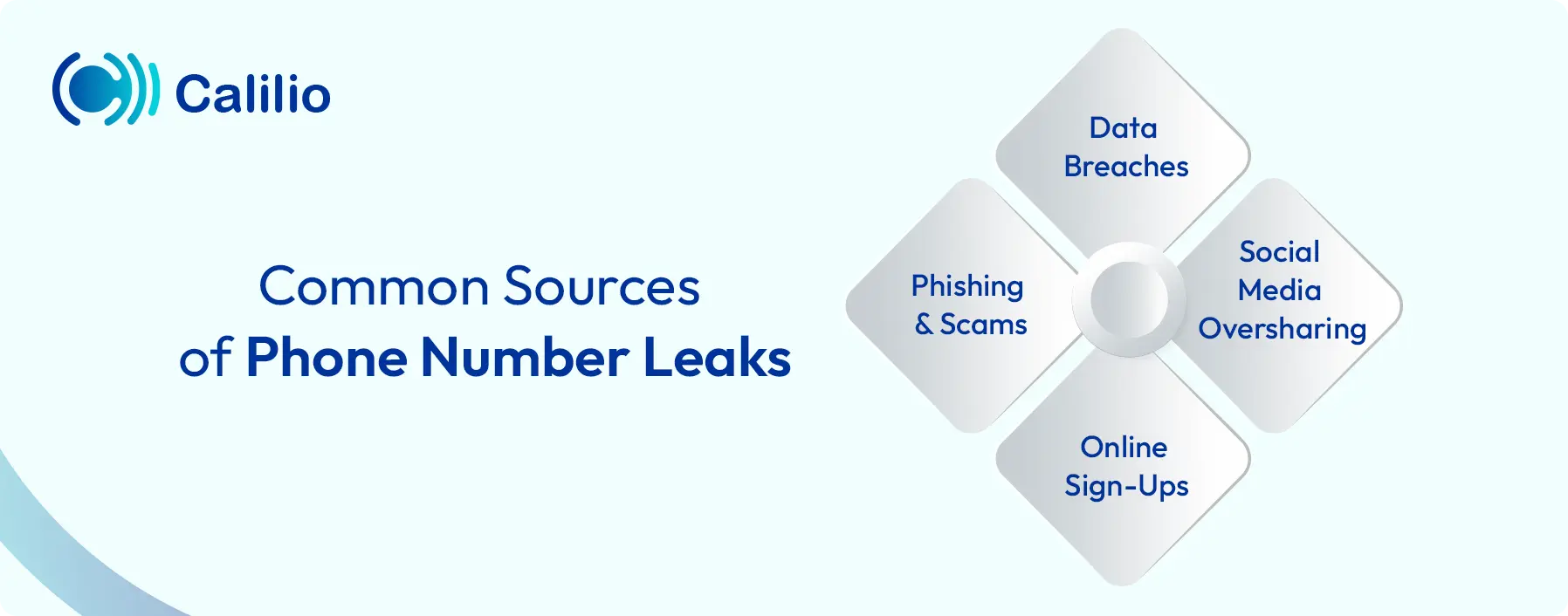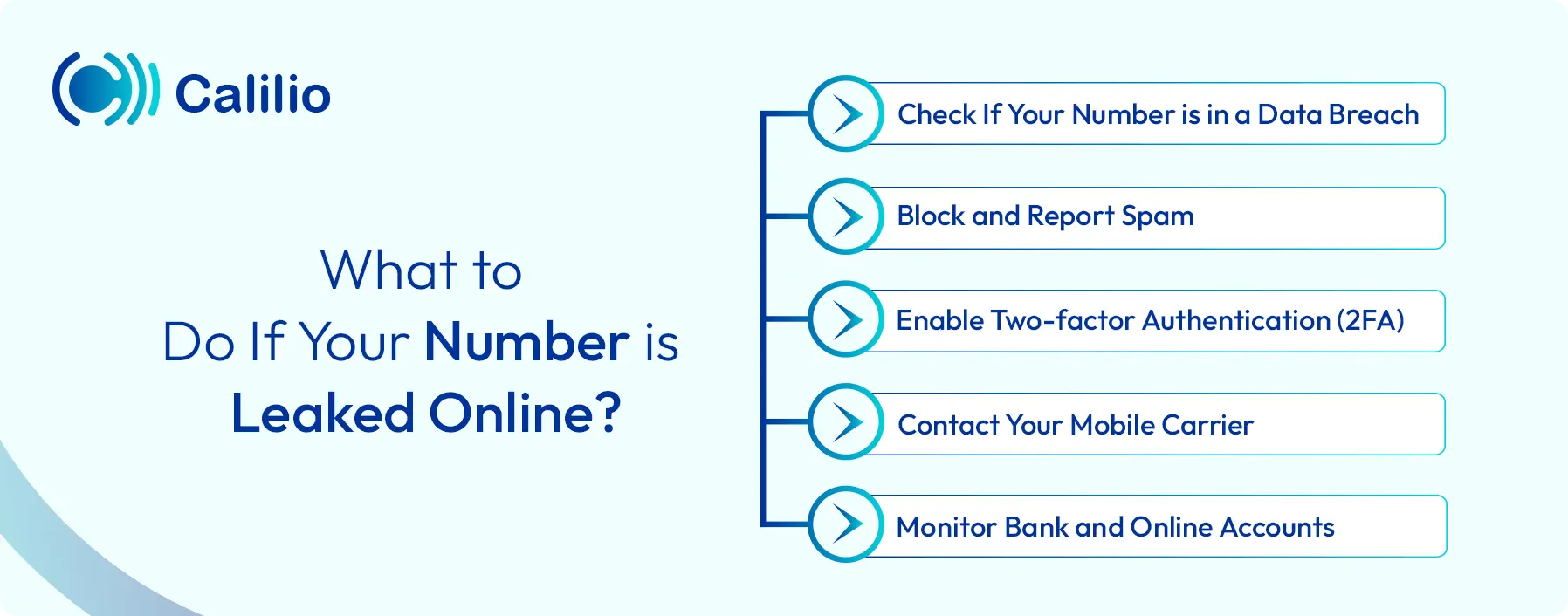What to Do If Your Phone Number is Leaked Online & How to Stay Safe?

A phone number leak may seem like a small issue, but it can expose you to serious risks. When your real number is available online, it becomes an easy entry point for scammers, spammers, and even cybercriminals. They can use a leaked phone number for unwanted calls, fraud attempts, or to access your online accounts.
The good news is that you can take control. By knowing the risks, acting quickly if your number is leaked, and following preventive measures, you can reduce threats and keep your personal and business communication safe.
In this guide, you will learn what a phone number leak means, the risks it creates, what steps to take immediately if it happens, and how to prevent future leaks to keep your information safe.
Key Highlights:
A phone number leak exposes you to spam calls, harassment, fraud, and even identity theft.
Common sources for leaked phone numbers include data breaches, social media oversharing, insecure online sign-ups, phishing scams, and unprotected apps.
If your number is leaked, act fast: check for data breaches, enable 2FA, contact your carrier, block spam calls, and monitor financial activity.
Prevent phone number leaks for the future by limiting where you share your number, auditing app permissions, using Do Not Call lists, and staying alert against phishing.
A virtual phone number is the best way to keep your real number private while staying connected.
What Does a Phone Number Leak Mean?
A phone number leak happens when your personal or business phone number becomes exposed without your consent. It may appear on public websites, online databases, or fall into the hands of hackers through data breaches. Once leaked, your number can be misused by strangers, telemarketers, or cybercriminals for unwanted contact or fraudulent activities.
Unlike a simple spam call, a leaked phone number is more serious because your number is tied to multiple online accounts, financial services, and identity verification systems. If someone has your number, they can attempt SIM swap fraud, intercept one-time passwords (OTPs), or use it to impersonate you online.
Common Sources of Phone Number Leaks
A phone number leak often happens through data breaches, public social media posts, or insecure online registrations. Fraudsters may also collect numbers through fake contests, suspicious links, and phishing sites.

- Data Breaches: When companies or apps are hacked, your stored phone number may get exposed along with other personal information.
- Social Media Oversharing: Posting your phone number on profiles, posts, or groups makes it easy for scammers to collect and misuse it.
- Online Sign-Ups: Using your real number on unsecured websites or directories can lead to it being publicly visible or sold.
- Phishing and Scams: Fraudulent websites, fake contests, or suspicious links can trick you into entering your number.
What are the Risks of a Real Phone Number Being Leaked Online?
A leaked phone number can lead to SIM swap fraud, account hijacking, and financial theft. It also increases spam calls, exposes you to harassment, and puts your personal privacy at risk.
1. Identity Theft and SIM Swap Fraud
When hackers know your number, they can request a SIM swap from your carrier. This gives them control over your calls and text messages. With that access, they can intercept OTPs and break into your email, bank, or social media accounts.
2. Spam Calls and Robocalls
Leaked phone numbers are often sold to telemarketers and scammers. Once your number is in these databases, you may face endless spam calls and automated robocalls. Over time, this disrupts your daily routine and makes it hard to identify genuine calls.
3. Account Takeovers
Many online platforms rely on phone numbers for verification. If criminals control your number, they can reset passwords and hijack your accounts. This could result in losing access to important services like banking, email, or cloud storage.
4. Privacy Invasion and Harassment
A leaked phone number can expose you to harassment from strangers. Some people may misuse it to send abusive messages or make threatening calls. This affects not only your peace of mind but also your personal safety.
5. Financial Fraud
Fraudsters can impersonate you using your number to deceive your contacts or financial institutions. They may attempt unauthorized transactions or social engineering scams. Such misuse could lead to direct financial losses.
What to Do If Your Number is Leaked Online?
If your phone number is leaked online, first check for data breaches, enable two-factor authentication, and secure your accounts. You should also contact your carrier for added protection, block spam calls, and closely monitor bank and online activities to stop fraud early.

1. Check If Your Number is in a Data Breach
Use trusted tools like Have I Been Pwned or other breach checkers to see if your number is part of a known leak. This helps you understand the scale of the exposure. If confirmed, review which accounts are at risk.
2. Block and Report Spam
Use your phone’s built-in spam filters or install call-blocking apps to reduce robocalls and phishing attempts. You can also report suspicious activity or numbers to your carrier to reduce future spam.
3. Enable Two-factor Authentication (2FA)
Secure your email, banking, and social media accounts with 2FA immediately. Use an authenticator app or hardware key instead of SMS whenever possible. This prevents hackers from accessing accounts even if they control your number.
4. Contact Your Mobile Carrier
Inform your carrier that your number may be compromised. Ask them to add extra security measures, such as a PIN, password, or port freeze, to stop SIM swap attempts. This step creates a strong barrier against identity theft.
5. Monitor Bank and Online Accounts
Regularly check your financial statements, email activity, and login alerts. If you see any unauthorized access, reset your credentials right away. Staying alert helps you stop fraudulent activity before it causes real damage.
How to Prevent Your Real Phone Number from Being Leaked Online?
To prevent your real phone number from being leaked online, limit where you share it, review app permissions, and stay alert against phishing attempts. You can also register on Do Not Call lists and use a virtual phone number for sign-ups or business activities to keep your personal number private.
I. Limit Online Exposure
Avoid sharing your phone number on public platforms like social media, forums, or public directories. If you must provide it, restrict visibility with privacy settings.
II. Review App Permissions Regularly
Some mobile apps request unnecessary access to your phone data, including your number. Audit the permissions on your device and revoke access for apps that don’t need it. This reduces the risk of your number being leaked through third-party apps.
III. Register on Do Not Call Lists
Many countries provide official Do Not Call registries to block telemarketers. Registering your number helps reduce unwanted calls from legitimate companies. While it won’t stop scams entirely, it cuts down exposure.
IV. Stay Alert Against Phishing Attempts
Never click on suspicious links in texts or emails that request personal details. Scammers often trick users into confirming or sharing their phone numbers. Staying cautious is one of the simplest ways to prevent exposure.
V. Use a Virtual Phone Number for Online Activities
Instead of using your real number for sign-ups, apps, or business communications, consider a virtual phone number. It acts as a protective layer by keeping your personal number private. If it gets exposed, you can simply replace it without losing access to your real number.
Conclusion
A phone number leak is more than an inconvenience—it can expose you to fraud, identity theft, and constant harassment. While taking immediate steps like enabling 2FA, monitoring accounts, and limiting online exposure can reduce threats, the smarter long-term solution is to separate your real number from daily online activities. That’s where Calilio helps.
With Calilio, you can get a virtual phone number from over 100 countries and use it for sign-ups, business calls, or online communication. You can also buy a secondary number or use a custom caller ID and keep your personal number completely private.
Summarize this blog with:
Frequently Asked Questions
How can I check if my phone number has been leaked?
You can check if your phone number has been leaked by using trusted tools like Have I Been Pwned or similar breach checkers that scan leaked databases. Enter your number to see if it has been exposed, and if confirmed, secure the linked accounts immediately.
Is it possible to remove my leaked phone number from the internet?
Is changing my phone number the best solution after a leak?

Still have questions?
Can’t find the answer you’re looking for? Please chat with our friendly team.
Stay in the loop
Get the latest call insights, trends, and updates delivered straight to your inbox.
By subscribing, you agree to receive updates from Calilio.
You can unsubscribe anytime.
